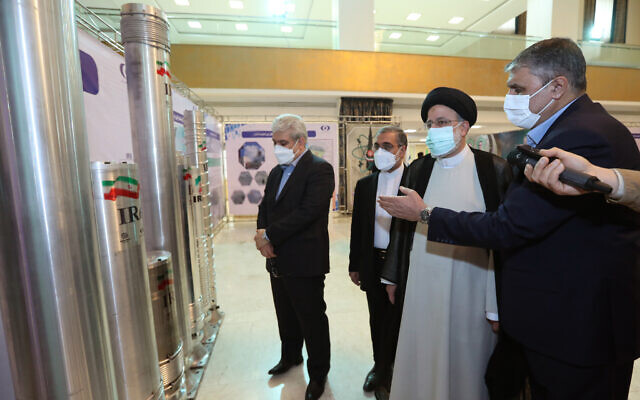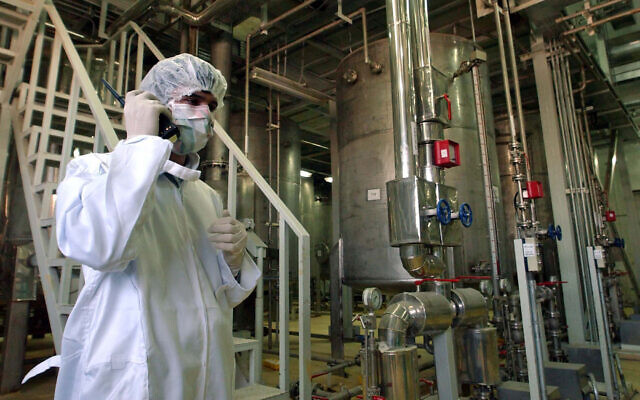As tensions between Iran and the West ramped up this week, Prime Minister Naftali Bennett warned in an interview published Saturday that without further pressure from the West, Tehran was moving “dangerously” close to producing a nuclear weapon.
“Iran is enriching uranium at an unprecedented rate and moving dangerously close to getting their hands on nuclear weapons,” he told the UK’s Telegraph in an interview earlier in the week.
Bennett called on the global community to join Israel and ramp up pressure against Iran’s nuclear program and ambitions.
“Without pressure from the West, the Islamic regime in Iran could get their hands on a nuclear bomb very soon,” he said. “The world must take a firm stance and tell the Islamic regime in Iran: no nukes, no sanctions. Iran’s nuclear program won’t stop until it’s stopped.”
In the article, the Telegraph also reported that Israel had asked the UK to establish a so-called “tripwire” mechanism to initiate harsher sanctions against Iran if it continued with its current nuclear program.
Get The Times of Israel's Daily Edition by email and never miss our top stories

Iran’s President Ebrahim Raisi, second right, listens to an explanation while viewing an advanced centrifuge at an exhibition of Iran’s nuclear achievements in Tehran, Iran on April 9, 2022. (Iran President’s Office)
According to the Telegraph, this mechanism will be separate from any possible future deal between Tehran and the West.
Bennett’s comments came after earlier this week, the UN nuclear watchdog formally censured Iran over its nuclear program on Wednesday, hours after the Islamic Republic said it disconnected some of the International Atomic Energy Agency’s cameras monitoring its nuclear sites.
Rafael Mariano Grossi, the IAEA director-general, warned that in three to four weeks, it would be unable to maintain a “continuity of knowledge” about Iran’s program. “This would be a fatal blow” to negotiations over Iran’s tattered nuclear deal with world powers, Grossi said.
Iran followed this up on Thursday by announcing that it has begun injecting gas into newly installed advanced uranium enrichment centrifuges.
Head of the Atomic Energy Organization of Iran Mohammad Eslami, who made the announcement during an interview with Iranian national TV, claimed the decision was in line with international regulations.
Eslami did not specify where the centrifuges in question were located. But his announcement came on the same day the UN’s nuclear watchdog reported that Tehran had informed it of its plan to install two new cascades of advanced centrifuges at the underground Natanz nuclear facility that will allow it to rapidly enrich more uranium.
The move by Iran’s atomic agency came in anticipation of ratification of the censure, drafted after the Vienna-based IAEA raised concerns about traces of enriched uranium previously found at three sites Tehran had not declared as having hosted nuclear activities.
Iran reached the deal limiting its nuclear program in return for sanctions relief — but the agreement has been on life support since then-president Donald Trump unilaterally withdrew the United States from it in 2018.
Tehran, which denies seeking to build a nuclear bomb, has backed away from some of its own commitments since 2019.
European capitals have expressed mounting concern over how far Iran has gone in resuming nuclear activities since the US began reimposing sanctions in 2018.

A person involved with security at the Uranium Conversion Facility just outside the city of Isfahan, Iran, on March 30, 2005. (AP Photo/Vahid Salemi, File)
Iran has built up large stockpiles of enriched uranium, some of it enriched to levels far higher than those needed for nuclear power generation.
The talks to revive the 2015 nuclear accord started in April 2021 with the aim of bringing the United States back in, lifting sanctions and getting Iran to return to the limits it agreed to on its nuclear activities.
But negotiations have stalled in recent months and the European Union’s top diplomat Josep Borrell warned last weekend that the possibility of returning to the accord was “shrinking.”


